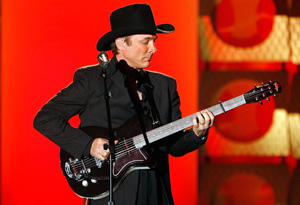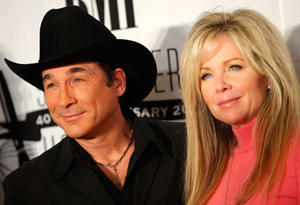A Conversation with Clint Black

Photo: 20th Century Fox Home Entertainment
He's a singer, a record producer, an occasional actor and a one-time Celebrity Apprentice, but at his core, country music legend Clint Black is a songwriter. Since his debut album was released in 1989, Clint has written and recorded more than 100 songs and sold more than 20 million albums worldwide.
As his latest film, Flicka 2, the next chapter in a beloved series, hits shelves, Clint returns to his first love—music.
See what inspired this Grammy nominee to wrangle wild horses on the small screen. Plus, what has parenthood taught him and his wife, actress Lisa Hartman Black?
Kari Forsee: What drew you to your character in Flicka 2, Toby?As his latest film, Flicka 2, the next chapter in a beloved series, hits shelves, Clint returns to his first love—music.
See what inspired this Grammy nominee to wrangle wild horses on the small screen. Plus, what has parenthood taught him and his wife, actress Lisa Hartman Black?
Clint Black: I liked Toby. I felt like he was a light-hearted character, nothing too heavy to do. I liked the character, but a lot of it had to do with the director, Michael [Damian]. I spoke to him on the phone after I read Toby, and he was just really encouraging. I made sure to let him know that I don't act a lot, and I'm really going to need to rely on you to help me to not embarrass myself, and he turned out to just be so great to work with. I called my agent after I finished filming, and said, "Okay, let's look." I never look for acting jobs; they always just find me.
KF: In the film, you play a ranch hand. Growing up in Katy, Texas, did you have a lot of experience with horses and working on a ranch?
CB: I had some experience, and when I shot the Jack Favor story, Still Holding On, I had a great team of trainers around me who were rodeo cowboys. So I just tried to learn everything from them that I could, and I got a lot of good insight into not just riding but just: "Who are cowboys today? And what are their sensibilities?" Mostly, the cowboys I've been around are like us—they're like musicians. They travel a lot. They travel sometimes in groups. They're always together back in these dressing rooms getting ready for their competitions, and to me, they're just real comfortable people to be around. It's like walking into my group.

Photo: Getty
KF: Do you think your admiration of cowboys inspired the country music star in you?
CB: No, I think it was really my parents. My mom loved all kinds of music. My dad strictly [listened to] country, except for Frank Sinatra and Tony Bennett. So, at a very early age, I was introduced to ... all the great country music from that time and before. I think it was partly that and partly the lyrics.
When I was in the ninth grade, I had a drama class, and one of the things you had to do was recite a poem in front of the class. ... I think, from that point on, I decided to grow up and be a lyricist. Lyrics really matter, and I think the most important thing about country music is the lyrics.
KF: You are one of few artists who writes and records almost all of your own music. Why is that?
CB: I've done a couple of tributes, but I set out to try and write all my own music because I respected the songwriters so much. My intent from the first album was to never be caught without enough songs to make an album I would be proud of. ... I'm a songwriter who happens to sing. I've got about 35 songs. I'm going to have to write a few more, and then, really narrow it down to the best album I can make. I look at it like they're my kids. If I'm raising a family of 10 kids, I want to send them all off to college. I'm not going to send my neighbors' kids and make one of my kids miss college. That's just not the way a parent is, so I can't do that with my songs.
CB: No, I think it was really my parents. My mom loved all kinds of music. My dad strictly [listened to] country, except for Frank Sinatra and Tony Bennett. So, at a very early age, I was introduced to ... all the great country music from that time and before. I think it was partly that and partly the lyrics.
When I was in the ninth grade, I had a drama class, and one of the things you had to do was recite a poem in front of the class. ... I think, from that point on, I decided to grow up and be a lyricist. Lyrics really matter, and I think the most important thing about country music is the lyrics.
KF: You are one of few artists who writes and records almost all of your own music. Why is that?
CB: I've done a couple of tributes, but I set out to try and write all my own music because I respected the songwriters so much. My intent from the first album was to never be caught without enough songs to make an album I would be proud of. ... I'm a songwriter who happens to sing. I've got about 35 songs. I'm going to have to write a few more, and then, really narrow it down to the best album I can make. I look at it like they're my kids. If I'm raising a family of 10 kids, I want to send them all off to college. I'm not going to send my neighbors' kids and make one of my kids miss college. That's just not the way a parent is, so I can't do that with my songs.

Photo: Getty
KF: Are you always working on a new song? What's your writing process like?
CB: I personally don't write all the time. I may if an idea pops in my head, I'll jot it down and keep it in a notebook, but I feel like that's a good way to dry up your well. I go into periods where I know I'm going to start writing, and at that point, its like turning on a faucet. I've got to keep putting glasses under there because it just won't stop coming out. I know when the faucet dries up, it's time to look again at the songs, start thinking about arrangements. But, whenever I decide to start writing, which it is now, the ideas are coming at me so quickly I really have to be diligent in getting it down on paper and making notes about the music and so on. Then, at some point, it's just, "Okay, I don't have anything new to say, so let's see what we have." Then it's like a jigsaw puzzle with too many pieces.
KF: Are you working on an album? If so, when will it be released?
CB: We have a few songs written that we're going to record in May. I have no idea when those will come out. There's one song that's out right now. ... The name of the album was We Are Enterprise and the name of the song is "Someday."
James Stroud produced this benefit album for a town [in Alabama] that was completely destroyed by a tornado, and so James got a bunch of artists he wanted to each contribute a song. To me, it was one of my best compositions ever, and for anyone who, like me, struggles with their faith and often asks the question, "Why is there so much suffering?" this song really, really speaks to that. There's an orchestra backing the choir on there. It's a real soulful sort of country, not gospel because it's not in that style, but it has all the voices and the strings. That's available on iTunes.
KF: What have you learned since the birth of your daughter in 2001?
CB: You know, the life that she is growing up in is so different than mine was or [my wife] Lisa's. Forget about the fact that we're celebrities, making records, making music, doing shows, making movies and all that. Just the world is so different now. The teaching is so different, the way they learn things.... You really realize just how important someone else can be when you're no longer the star of your own life. She is the star of our lives now and the center of it all.
CB: I personally don't write all the time. I may if an idea pops in my head, I'll jot it down and keep it in a notebook, but I feel like that's a good way to dry up your well. I go into periods where I know I'm going to start writing, and at that point, its like turning on a faucet. I've got to keep putting glasses under there because it just won't stop coming out. I know when the faucet dries up, it's time to look again at the songs, start thinking about arrangements. But, whenever I decide to start writing, which it is now, the ideas are coming at me so quickly I really have to be diligent in getting it down on paper and making notes about the music and so on. Then, at some point, it's just, "Okay, I don't have anything new to say, so let's see what we have." Then it's like a jigsaw puzzle with too many pieces.
KF: Are you working on an album? If so, when will it be released?
CB: We have a few songs written that we're going to record in May. I have no idea when those will come out. There's one song that's out right now. ... The name of the album was We Are Enterprise and the name of the song is "Someday."
James Stroud produced this benefit album for a town [in Alabama] that was completely destroyed by a tornado, and so James got a bunch of artists he wanted to each contribute a song. To me, it was one of my best compositions ever, and for anyone who, like me, struggles with their faith and often asks the question, "Why is there so much suffering?" this song really, really speaks to that. There's an orchestra backing the choir on there. It's a real soulful sort of country, not gospel because it's not in that style, but it has all the voices and the strings. That's available on iTunes.
KF: What have you learned since the birth of your daughter in 2001?
CB: You know, the life that she is growing up in is so different than mine was or [my wife] Lisa's. Forget about the fact that we're celebrities, making records, making music, doing shows, making movies and all that. Just the world is so different now. The teaching is so different, the way they learn things.... You really realize just how important someone else can be when you're no longer the star of your own life. She is the star of our lives now and the center of it all.



